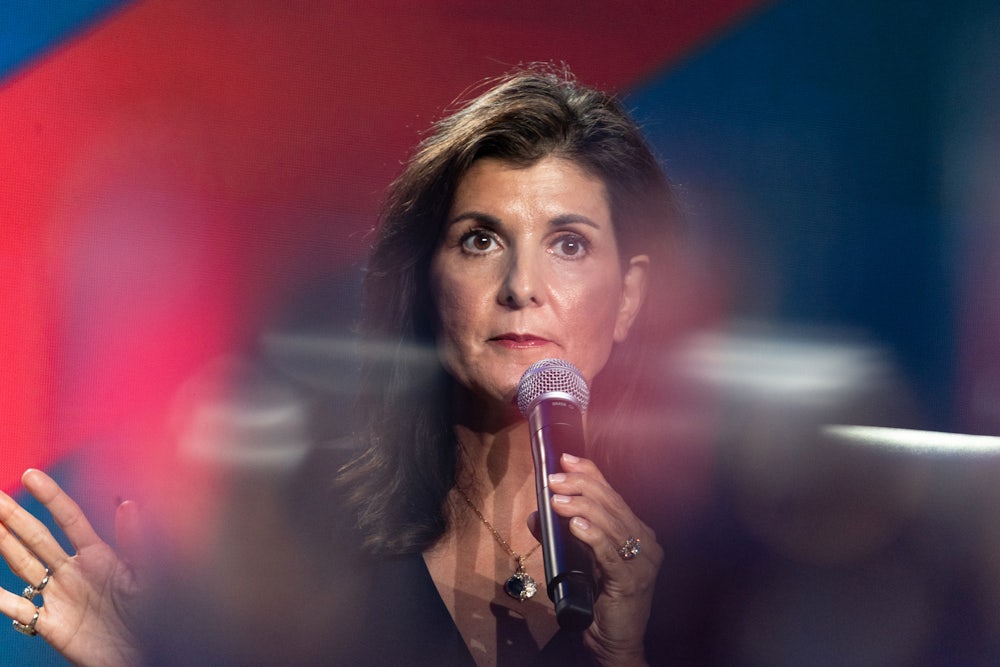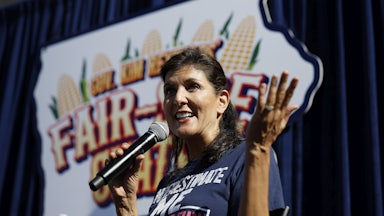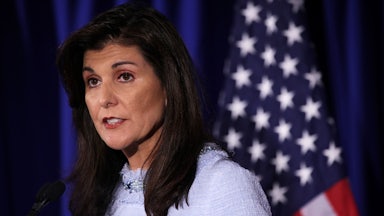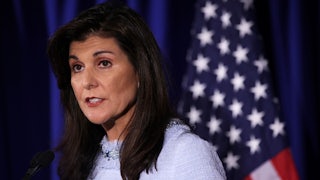With war breaking out between Hamas and Israel, the Republicans running in the 2024 presidential primary have been called forth to weigh in on foreign policy with moderately more vigor, bogged down as they previously were in their local competition to out-transphobe one another and scapegoat immigrants in the most flamboyant fashion possible. Arguably, for most of the candidates, this humanitarian disaster will be their first serious engagement with global geopolitics. Only former U.N. Ambassador Nikki Haley can claim working experience in the field—and, yes, I’m including Donald Trump.
But Haley is making the most of the moment, showcasing how her tenure at the U.N. afforded her the opportunity to voice the Republican Party’s generations-long, single-minded pro-Israel mentality regularly, even as rival Ron DeSantis was engaged in the GOP’s other generational fixation, preventing Black people from voting. It’s hard to imagine that Trump’s U.N. representative had much reason to moderate her views, but she’s really going for it now. “This is sick, and we have to treat sick people the way they deserve to be treated and eliminate them,” she commanded Netanyahu: “Finish them.” (Leave it to the emphatically millennial Vivek Ramaswamy to clock the Mortal Kombat reference, countering to Haley that the bloodshed is “not a video game.”)
And so world events have coincided with Haley’s improved polling, thus ending her quiet—very quiet—emergence as the contender for the GOP primary’s chief Trump antagonist, offering a more explicit distinction from the legally troubled front-runner than Ron DeSantis’s clumsy feints at out-Trumping Trump. Haley is likely the beneficiary of some soft sexism; she hasn’t been taken seriously as a candidate, and that lack of critical coverage has allowed her to present herself to voters precisely as she likes rather than contend with the cockeyed glare of reporters or rivals. (Tim Scott’s attacks in the last debate—over accepting drapes from Obama?—were perhaps a rather sincere attempt at punching sideways.)
It’s true that DeSantis has profited from a years-long positioning campaign depicting him as some heir-apparent to Trump’s bloodline, in addition to being a man. But even Ramaswamy’s willingness to self-immolate on the pyre of Trump fealty (betting that the long arm of the law will snatch Trump in its clutches before Trump can notch the nomination, I guess?) garnered more chin-stroking hypotheticals about general election positioning than Haley’s strong far-right résumé.
And make no mistake, Haley has little else but far-right positions and deeply conservative policies in her portfolio. She has supported granting fetuses civil rights, a pseudoscientific arrangement that once undergirded Ireland’s abortion laws, and that turned out great. She’s anti–gun control and wants metal detectors and law enforcement stationed at every school. She has said that Florida’s “Don’t say gay” bill “doesn’t go far enough,” she has pledged to fight any measure to limit police funding, she believes that critical race theory “is going to hold back generations of young people.” (In a roundabout way—since CRT scaremongering is an excuse to ban books—I suppose she’s right about that.)
We’ve just become so accustomed to the blaring waaa-hooo-ga fascism of Trump and his imitators, I guess no one bothers to decode dog whistles anymore. On social issues, Haley cloaks the broadly objectionable in polite conversation, even using the buzzwords of the left: She heralds the segregation of children’s sports by their assigned birth as “the women’s issue of our time” and wrings the truly devastating statistics about youth suicide into proof of her point: “We should be growing strong girls; confident girls,” she told Jake Tapper. Advocates want “biological boys … in their locker room” and “then wonder why a third of our teenage girls seriously contemplated suicide last year.”
Haley is a gifted ideologue clothed in moderate drag. Her speaking style never gets more excitable than a local newscaster talking about good weather over a long weekend; her indignant mode wouldn’t draw attention at your average school board meeting, let alone a Republican debate. Her dress and makeup are strenuously unremarkable, and she tends to allow her interrogators to bring up hot-button issues rather than sweatily clout-chase Libs of TikTok memes.
Since Haley entered the national conversation as the governor of South Carolina in 2010, she’s leaned hard into the message of insurgency against the last generation of Republicans—the “old boy network” and such—and she has been happy to use the left as a foil. Still, she never emerged as a lightning rod like the hungrily controversial women who emerged from the Tea Party movement. Trend stories lumped her in with Michelle Bachmann, Christine O’Donnell, and Sharron Angle (“Mama grizzlies,” if you remember?) at the time. Unlike Haley, they enthusiastically tossed out the kind of red meat that made them easy targets for the left and darlings of the CPAC circuit. Haley, by contrast, posed for Vogue fashion shoots and raked in glowing news magazine profiles (“The New Face of the South?” asked one cover).
Indeed, from the outside, her governorship was marked by quaintly conventional scandals, such as cronyism; The New York Times led a story about her by noting her iPod playlist. Her smartly bland camouflage has withstood the test of time to put her in the running to steer the Tea Party’s grotesque progeny, which is to say, the Republican Party writ large.
Most recent coverage has centered on how she talks about abortion. Haley says that the nation needs “consensus.” Naturally, many media outlets are doing some of the work for her, transmuting her soft rhetoric into some actual change in policy, but let’s be clear: To say that you want consensus on an issue when you have also been passionately fighting for a specific policy just means you want people to agree with you. The sentimentality of her claim, “I don’t judge anyone for being pro-choice, any more than I want you to judge me for being pro-life,” is a smokescreen in front of the hard facts of abortion access. There are millions of women who would happily be judged for getting an abortion, if they only could get one. Nikki Haley isn’t judging me, yay. Feelings aren’t facts, I heard someone say once.
Perhaps Haley’s sneakiest maneuver has been to poke at the easily poked Mike Pence over his stated goal of a national abortion ban. During the August GOP debate, she scolded him over floating the ban as a political promise. “When you’re talking about a federal ban, be honest with the American people,” she said, pointing out that the filibuster threshold means (for now) that such legislation could never pass. Her admonishment, “Do not make women feel like they have to decide on this issue,” sounds almost like advocacy for women, except that she’s hiding the truth: Whether a candidate wants a national abortion ban—regardless of their power to impose it—very much matters when deciding who to support! Yet we have seen a flurry of credulous headlines: her “search of common ground,” she “seeks a New Path on Abortion for G.O.P,” she argues “the need for a broad middle ground.”
Flustering Pence is no feat, but snowing political reporters into believing that her pushback means she’s any less interested in robbing women of agency would be impressive if political reporters weren’t, in general, so easily snowed. (See also: Susan Collins, whose submerging of her extremist views on abortion has been so total that many political reporters still strain themselves into exhaustion trying to shove her anti-abortion peg into the pro-choice hole.)
When forced to defend her crypto-anti-choice beliefs in the face of more openly forced-birth advocates, Haley points to her record as a state legislator: “I voted for every pro-life bill that came before me.” She did! Including bills that made no exception for pregnancies resulting from rape or incest. Now in the real world, those exceptions don’t really exist because they can’t be practically applied (is a doctor supposed to get a blood test from the predator? Wait for a court to decide the matter? Do you think Republicans really mean for a health care provider to take a woman at her word?), but I’m assured that some Republicans see daylight there—probably the same sober-minded Trump skeptics who find Haley’s decorum a breath of fresh air.
In New Hampshire, where Haley is in second place, a GOP operative lauded her for appealing to “the adults in the room.” A recent CNN poll found Haley’s support among “moderates” at 24 percent last month, up from 6 percent in the summer. Among independents, she beats Biden by more than any other Republican candidate. Her support also went up a few points with conservatives. There’s still no sign that Haley will overtake Trump in the polls and seize the nomination on her own. But I would still say that everything is going exactly to plan.










